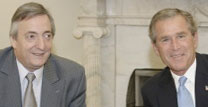US McCarthyism irritates Argentine government
 Diplomatic relations between both countries deteriorated, as Washington said it was “concerned” of Buenos Aires ties with Cuba. The White House called Argentine President Nestor Kirchner on a meeting with Bush next Tuesday. The Argentine leader said he would defeat US head of State by “knock out”.
Diplomatic relations between both countries deteriorated, as Washington said it was “concerned” of Buenos Aires ties with Cuba. The White House called Argentine President Nestor Kirchner on a meeting with Bush next Tuesday. The Argentine leader said he would defeat US head of State by “knock out”.
A high level diplomatic dispute begun this week between Argentina and the United States, after Roger Noriega, U.S. assistant Secretary of State for Western Hemisphere affairs, told reporters on Tuesday he was "disappointed" officials visiting Cuba failed to meet dissidents, a reference to Foreign Minister Rafael Bielsa's recent trip to the island. Argentine Foreign Ministry replied on Wednesday saying Noriega's declarations were “aggressive and inopportune”, since it was a sovereign nation entitled to head its diplomacy as wished.
However, the strongest answer came from President Kirchner, who said in a statement that Argentina was an independent nation and no longer a “carpet to trample on it”. Kirchner's reply came shortly after it became known that the White House had called on an urgent summit between George W. Bush and the Argentine head of State next Tuesday, as the US President wanted to have a “clearer picture” on Argentine position toward Cuba. When asked by the local press about the meeting with Bush, Kirchner replied: “we will knock them out”.
After Castro’s visit to Buenos Aires in May, to attend to Kirchner’s inauguration, Argentina restored full diplomatic ties with Cuba. Then Foreign Minister, Rafael Bielsa, met Castro in Havanna and, according to official information, refused to meet internal dissidents. Next June, the United Nations Human Rights Committee is expected to vote on Cuba, and Washington desperately looks for support to a condemn resolution to the Island. Last year, Argentina moved from supporting US proposal to abstain.
On the other side, US support to Argentina during the negotiations with the IMF to restructure its defaulted debt, allowed the South Americans to reach a positive deal. However, private debt holders say the agreement discriminates them, as while Argentina will pay its debt with IMF in full, offers them a 75% cut.
Since then, Kirchner won few friends in Washington with his criticisms of the International Monetary Fund, blaming it for Argentina's collapse in 2002, and his tough stance on creditors holding $88 billion in Argentina's defaulted debt. Kirchner criticism came after the IMF begun to look for changes to the agreement signed in September, ceding to private holders demands. Argentina replied it would not pay any extra-dollar to the agreed.
This week's clash ratcheted up tension between the United States and Argentina, which under Kirchner has established closer ties with Washington's main political enemies in Latin America, from Cuban President Fidel Castro to Venezuela's President Hugo Chavez. Sources in Washington said some U.S. officials have said there is a growing alliance emerging in Latin America between Cuba, Venezuela, Brazil and Argentina, countries that have swung to the left in recent years amid a backlash against free-market policies fueled by Washington.
Kirchner also “irritated” US Hawks after meeting Bolivian leftist leader, Evo Morales, accused by Washington of plotting the popular rebellion that ousted President Gonzalo Sanchez de Lozada last year. Observers believe recent US anti-Castro offensive is related to next presidential race. Bush runs for reelection as badly needs the votes of the Cuban community living in the State of Florida, source of his controversial victory in 2000.
Hernan Etchaleco,
Pravda.Ru
Subscribe to Pravda.Ru Telegram channel, Facebook, RSS!




